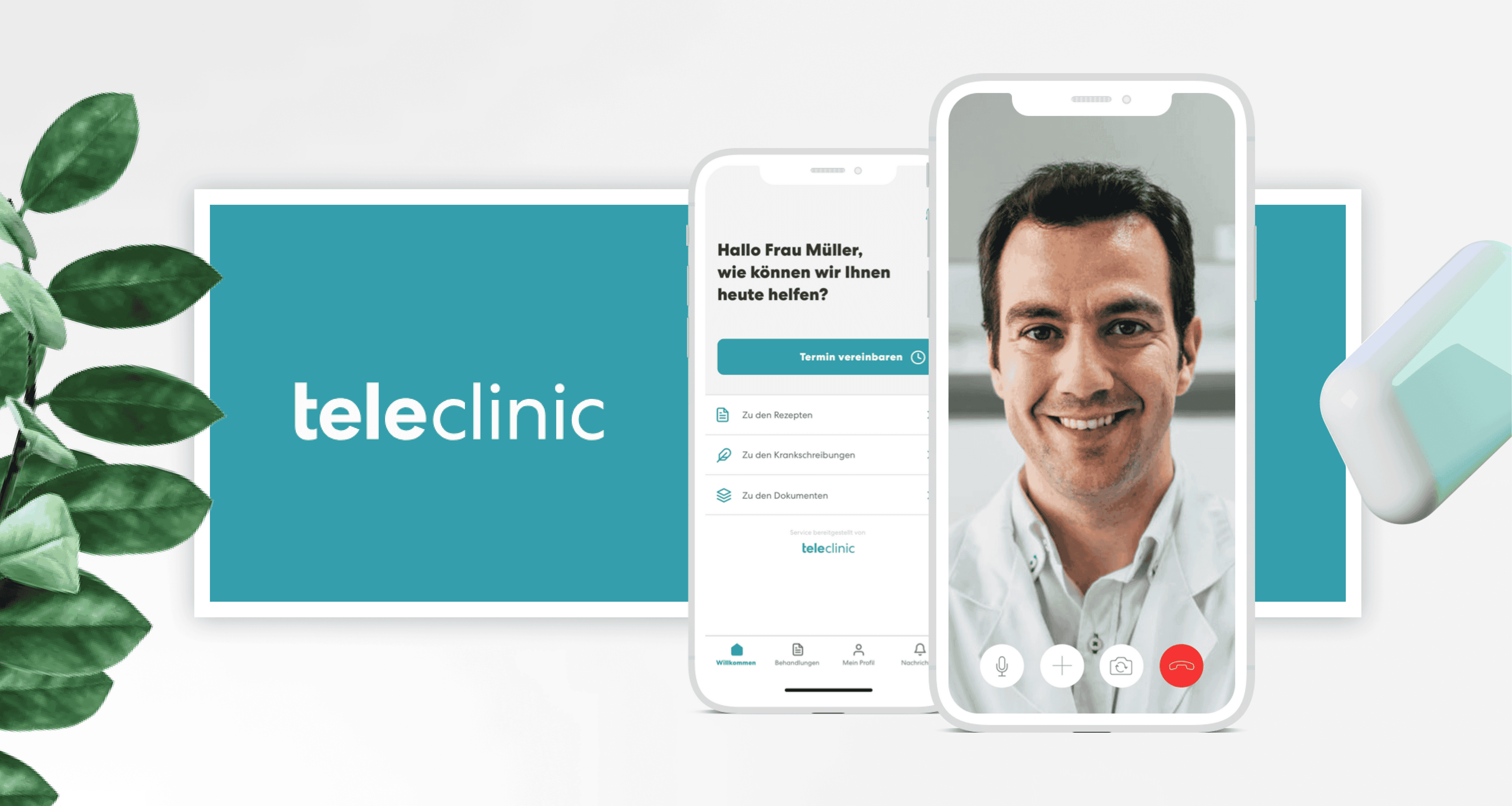Teleclinic is a leading German telemedicine company based in Munich. The innovative platform allows patients to conveniently access medical advice and treatment from home. Teleclinic places great emphasis on the highest medical standards and quality and offers a secure and user-friendly platform. Its goal is to improve healthcare and facilitate access to medical advice. The digital signature of prescriptions is an essential part of its service offering. In June 2022, sproof sign was selected as the provider for digital signature workflows.
Portrait

Company name:
telelclinic
Brief description of the project:
The qualified signing of prescriptions from the point of view of physicians is one of the most important use cases of the Munich-based telemedicine provider. Due to the highest demands on security, compliance and flexibility, the German player in online healthcare has deeply integrated sproof sign for the comprehensive handling of signature processes.
Why sproof sign:
"Our goal was to find a signature provider that on the one hand meets the highest standards, but above all convinces with a very fast and simple signature workflow. With sproof sign, we found an optimal partner."

Analena Aumüller, Product Manager
sproof: What was the purpose of integrating the digital signature into your platform?
Aumüller: Our main use case for the digital signature is the qualified signing of prescriptions by doctors on our web platform. We want to continuously adapt our product to the needs of our users, both in terms of user experience and workflow. It was never our intention to develop our own product to provide qualified signatures. Instead, we wanted to integrate a third-party provider with sproof. sproof was the best solution for us because we could make individual adjustments. The cooperation was very close and we were able to implement our wishes and ideas to satisfy our customers.
sproof: Are prescriptions only signed by doctors or are there other use cases as well?
Aumüller: Our main use case is signing private prescriptions. That's essentially what sproof is used for. We don't have any other use cases, at least not at the moment.
sproof: What problem does the Teleclinic solve?
Aumüller: The teleclinic is an online platform where doctors can interact with patients online. As a patient, I no longer have to come to the practice in person. I can easily make an appointment from home and talk to qualified physicians. We check the doctors' qualifications in advance. The contact between patient and doctor takes place via a video call, in which all relevant problems of the patient can be discussed, be it the issuing of a prescription, a certificate of incapacity to work or a referral to a specialist. Numerous physicians from various specialties are registered on our platform. In my area, we are particularly concerned with the requirements of physicians, such as documentation, prescription issuing and billing. My team and I ensure that these processes run smoothly.
sproof: Can you say something about the frequency of signatures? How often is a signature actually required?
Aumüller: That varies, of course, depending on the day and the day of the week. Less work is done at the weekend than during the week. Over a period of three months, there are several hundred signatures per day on average. So that's a pretty high number. If there are problems, we are quickly made aware of them, and we also get a lot of feedback from the doctors on how we can improve. It's a very heavily used area of our product, so individual engagement is important to us.
"By integrating sproof, we've actually seen a significant reduction in the time it takes for physician:s to sign."
Analena AumüllerProduct Manager
sproof: That sounds like an integral part of your business model and not just an incidental integration into your portfolio.
Aumüller: Prescriptions and the associated signature are an integral part of patient care.
sproof: Is the qualified signature essential for this use case? When planning the feature, how quickly was it clear that it had to be qualified signatures?
Aumüller: We had already integrated qualified signatures via other providers before, but the user experience was not what we had imagined for the physicians. The onboarding was lengthy and we couldn't customize or help design the user interface. It was an integration with limited capabilities and it was difficult to troubleshoot or get support. So we decided to find a solution that was more responsive to user needs and that we could influence in some way. We did extensive research to find vendors in the market who could work closely with us and were willing to help shape the product. Regarding the signature standard: It was clear from the outset that only qualified signatures would be considered. Prescriptions must be signed with a qualified signature, otherwise they cannot be redeemed at the pharmacy.
sproof: You talk about a better user journey for physicians. Where did you want to simplify the signing process?
Aumüller: With the previous solution, you had to jump back and forth between different tabs and it was very cumbersome overall. We wanted the doctors to be able to work efficiently and saw potential for improvement, particularly in the prescription creation process. The process was not personalized and required multiple logins. We wanted to reduce the amount of time physicians spent on such user flows. By integrating sproof, we have actually seen a significant reduction in the time doctors need to spend on signatures.
sproof: That makes us very happy. Can you estimate by how much the signature process has sped up?
Aumüller: We looked at the figures since the full rollout in June last year and compared them with the previous year. We looked at how long it takes doctors to successfully sign/issue a prescription. In other words, from clicking on the button to enter the prescription issuing workflow to successful signing.
The time required for signing has been greatly reduced!
sproof: What are the most important features for your users?
Aumüller: It was important for us that the physician can complete the identification for the qualified SIgnature within the app. The integration allows the physician to be automatically redirected to the platform to complete the registration. It was also important to us that the process is self-explanatory and that the physician knows where they are. The whole process is now very streamlined and the support effort is very low. Of course, the batch signature is one of the biggest benefits for our physicians?
sproof: Is the batch signature used frequently?
Aumüller: Since the prescriptions often have a very identical structure and the doctors know the prescription very well anyway, the batch signature in conjunction with the very clear document preview makes it possible to sign very many prescriptions with very few clicks and only one approval with the cell phone.
sproof: A final word?
Aumüller: We entered into the collaboration with you with high expectations. The collaboration is very productive, adjustments are always implemented quickly.
sproof: Thank you very much for your time.
More blog entries
The digital signature is making its way into Austria's law firms.The best of both worlds. Linde & sproof. Request electronic signatures - obtain multiple digital signatures via email (internal & external)Team Axess chooses digital signature solution from sproof signHow does the qualified digital signature work?


